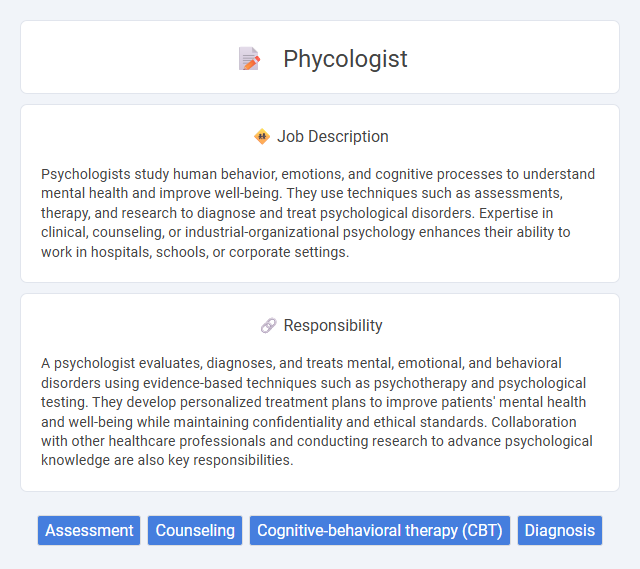
Psychologists study human behavior, emotions, and cognitive processes to understand mental health and improve well-being. They use techniques such as assessments, therapy, and research to diagnose and treat psychological disorders. Expertise in clinical, counseling, or industrial-organizational psychology enhances their ability to work in hospitals, schools, or corporate settings.
Individuals experiencing high levels of empathy, strong communication skills, and a genuine interest in understanding human behavior are likely suitable for a psychologist career. Those prone to emotional exhaustion or difficulty managing personal boundaries may find the demands of this job challenging. The probability of success increases with resilience, patience, and a passion for helping others navigate mental health conditions.
Qualification
A psychologist typically requires a minimum of a master's degree in psychology, with many positions demanding a doctoral degree (Ph.D. or Psy.D.) for clinical practice and research roles. Licensure or certification is essential, usually involving supervised clinical experience and passing a state or national exam such as the Examination for Professional Practice in Psychology (EPPP). Specialized training in areas like clinical, counseling, forensic, or industrial-organizational psychology enhances job prospects and professional expertise.
Responsibility
A psychologist evaluates, diagnoses, and treats mental, emotional, and behavioral disorders using evidence-based techniques such as psychotherapy and psychological testing. They develop personalized treatment plans to improve patients' mental health and well-being while maintaining confidentiality and ethical standards. Collaboration with other healthcare professionals and conducting research to advance psychological knowledge are also key responsibilities.
Benefit
A psychologist's role likely offers significant benefits such as improving mental health and enhancing emotional well-being for individuals. The profession probably provides opportunities for personal growth and fulfillment through helping others navigate psychological challenges. Job stability and the potential for diverse career paths may also contribute to its attractiveness as a career choice.
Challenge
The psychologist job likely involves navigating complex mental health challenges that require critical thinking and empathy. Professionals in this field face the probability of encountering diverse behavioral issues, demanding continuous learning and adaptability. The role may challenge one's ability to balance scientific knowledge with emotional sensitivity to effectively support clients.
Career Advancement
A psychologist career path offers diverse opportunities for specialization in clinical, counseling, or research fields, enhancing professional growth. Advancing to roles such as clinical director, senior therapist, or academic researcher requires obtaining advanced degrees like a PhD or PsyD and relevant certifications. Continuous professional development through workshops and publications significantly boosts job prospects and leadership potential in psychology.
Key Terms
Assessment
Psychologists use a variety of assessment methods, including standardized tests, interviews, and behavioral observations, to evaluate cognitive, emotional, and behavioral functions. These assessments provide critical data for diagnosing mental health disorders, planning treatment strategies, and tracking patient progress. Effective psychological assessment requires expertise in psychometrics, clinical interviewing, and interpreting results within the context of each individual's unique background.
Counseling
Psychologists specializing in counseling provide mental health support through therapy sessions aimed at improving emotional well-being and coping mechanisms. They apply evidence-based techniques such as cognitive-behavioral therapy (CBT) and humanistic approaches to address issues like anxiety, depression, and relationship challenges. Their work often involves assessment, diagnosis, and personalized treatment plans to facilitate personal growth and mental health recovery.
Cognitive-behavioral therapy (CBT)
Psychologists specializing in Cognitive-Behavioral Therapy (CBT) use evidence-based techniques to help clients identify and modify negative thought patterns and behaviors. CBT has proven effective in treating anxiety, depression, and other mental health disorders by promoting practical skills for emotional regulation and problem-solving. The demand for trained CBT psychologists continues to grow due to the therapy's strong empirical support and adaptability across diverse populations.
Diagnosis
Psychologists specialize in diagnosing mental health conditions by conducting comprehensive assessments, including interviews, psychological testing, and behavioral observations. Accurate diagnosis enables tailored treatment plans that address specific cognitive, emotional, and behavioral issues. Advanced diagnostic tools, such as DSM-5 criteria and neuropsychological evaluations, enhance the precision of psychological assessments.
 kuljobs.com
kuljobs.com